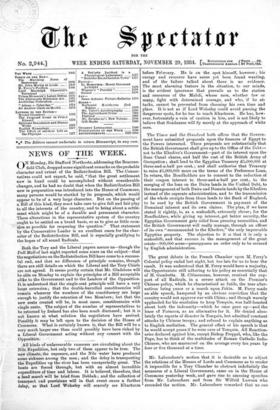The T ivies and the Standard both affirm that the
Govern- ment have submitted proposals upon the finances of Egypt to the Powers interested. These proposals are substantially that the British Government shall give up to the Office of the Debt— not to the Khedive's Government—part of its interest upon the Suez Canal shares, and half the cost of the British Army of Occupation ; shall lend to the Egyptian Treasury £5,000,000 at three-and-a-half per cent. ; and shall authorise that Treasury to raise 25,000,000 more on the terms of the Preference Loan. In return, the Bondholders are to consent to the reduction of their coupon interest to three-and-a-half per cent., to the merging of the loan on the Daira lands in the Unified Debt, to the management of both Daira and Domain lands by the Khedive, instead of the separate administration, and to the transmission of the whole receipts from those lands to the Bank of England, to be used by the British Government in payment of the Domainal interest and its own claims. The plan, if we have stated it rightly, is, as a makeshift, extremely clever ; for the Bondholders, while giving up interest, get better security, the Egyptian Government gets relief from pressing necessities, and the British Government will really manage, through an officer of its own "recommended to the Khedive," the only improvable Egyptian property. The objection to it is that it is only a makeshift, and that success in the management of the great estate-900,000 acres—presupposes an order only to be secured by English administration.






































